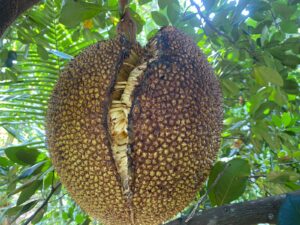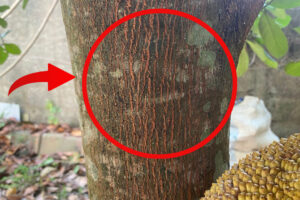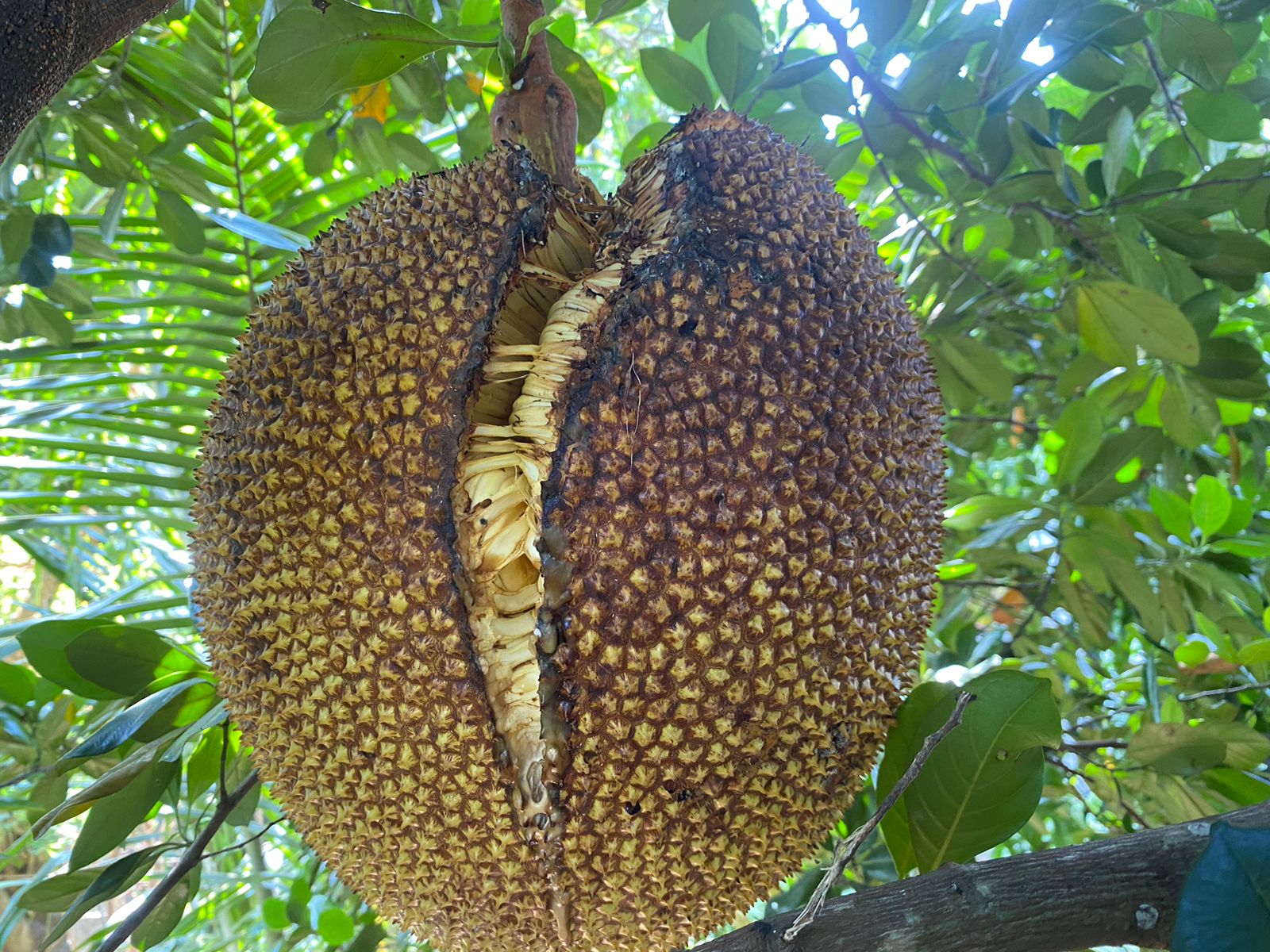Jackfruit, known as the “king of fruits,” is a tropical delicacy cherished for its unique flavour and versatility in culinary creations. However, despite its popularity, jackfruit growers often need help cracking fruit. This article delves into the intricate reasons behind jackfruit cracking and provides expert tips to prevent this phenomenon, ensuring a bountiful harvest of intact, delicious fruits. Reading it till the end will answer your problem.

:
Jackfruit cracking is a phenomenon characterized by the appearance of fissures or splits in the fruit’s skin, and it can manifest at different stages of fruit development, ranging from immature to mature fruits. The causes of cracking are diverse and involve environmental factors, cultural practices, and varietal characteristics.
Environmental factors play a significant role in jackfruit cracking. Excessive rainfall or sudden changes in irrigation practices can rapidly expand the fruit, causing the skin to stretch beyond its capacity and resulting in cracks. Conversely, drought conditions followed by heavy rainfall can disrupt the fruit’s development and increase its susceptibility to cracking.
Cultural practices, such as inconsistent watering or nutrient imbalances, can also contribute to jackfruit cracking. Irregular watering practices or deficiencies in soil nutrients, particularly calcium, can weaken the fruit’s skin structure, making it more prone to cracking. Proper soil nutrition management and consistent watering practices are essential for preventing cracking.
Additionally, varietal characteristics influence the susceptibility of jackfruit to cracking. Some varieties are inherently more prone to cracking due to genetic factors that affect skin thickness and elasticity. Growers should select varieties known for their resistance to cracking to minimize this issue.
Preventing Jackfruit Cracking:

- Consistent Watering Practices: Maintain consistent watering practices throughout the growing season, ensuring the soil remains evenly moist without becoming waterlogged. Avoid sudden fluctuations in irrigation to prevent stress on the fruit.
- Mulching: To control soil moisture levels and lower the chance of moisture-related stress, use organic mulch at the base of jackfruit trees to avoid cracking.
- Soil Nutrition Management: Conduct regular soil tests to assess nutrient levels, particularly calcium, and address deficiencies through appropriate fertilization practices. Adequate calcium levels strengthen the fruit’s skin, reducing the likelihood of cracking.
- Environmental Management: Protect jackfruit trees from extreme environmental conditions, such as high temperatures, strong winds, and fluctuations in humidity, which can stress the fruit and increase susceptibility to cracking.
- Pest and Disease Control: Implement proactive pest and disease management strategies to prevent damage to the fruit’s skin, which can weaken its integrity and predispose it to cracking.
Here are some additional details on preventing jackfruit cracking through pest and disease control:
- Integrated Pest Management (IPM): Implement an IPM approach to control pests effectively while minimizing environmental impact. This involves monitoring pest populations, employing biological controls such as natural predators or parasitoids, and using targeted chemical treatments only when necessary.
- Sanitation: Maintain good orchard hygiene by regularly removing fallen fruit, pruned branches, and other plant debris. This helps reduce the presence of pest breeding grounds and minimizes the spread of diseases that could weaken the fruit’s skin.
- Disease-resistant Varieties: Selecting jackfruit varieties known for their resistance to common diseases can help reduce the risk of fruit damage and cracking. Consult with local agricultural experts or nurseries to identify suitable disease-resistant cultivars for your region.
- Fungicide Applications: When necessary, apply fungicides according to recommended guidelines to control fungal diseases that may weaken the fruit’s skin and increase susceptibility to cracking. It’s essential to follow label instructions carefully and adhere to appropriate safety precautions when using chemical treatments.
- Regular Monitoring: Inspect your jackfruit trees to identify early signs of pest infestations or disease outbreaks. Prompt detection allows for timely intervention, minimizing potential damage to the fruit and reducing the risk of cracking.
- Pruning: To increase airflow and sunshine penetration within the canopy, prune jackfruit trees as needed, which helps reduce humidity levels and creates less favourable conditions for disease development. Additionally, removing diseased or damaged branches can prevent the spread of pathogens to healthy fruit.
- Crop Rotation: If growing jackfruit in rotation with other crops, practice proper crop rotation to reduce the soil’s buildup of pest and disease populations. Rotating with non-host crops can help break pest and disease cycles and maintain overall orchard health.When these disease and pest management strategies are used with the aforementioned preventive measures, growers can create a comprehensive plan to minimize jackfruit cracking and promote healthy fruit development.
Conclusion:
Jackfruit cracking is a common challenge faced by growers, but with a proper understanding of its causes and proactive preventive measures, it can be effectively mitigated. Growers can enjoy a fruitful harvest of intact, luscious jackfruits by implementing consistent watering practices, ensuring optimal soil nutrition, and protecting trees from environmental stressors.
-

Jackfruit leaf AtoZ
FAQ
Q: What is jackfruit cracking?
A: Jackfruit cracking refers to the appearance of fissures or splits in the fruit’s skin; this might happen at various times during the fruit’s development.
Q: What causes jackfruit cracking?
A: Jackfruit cracking can be caused by various factors, including environmental stressors like excessive rainfall or drought followed by heavy rainfall, cultural practices such as inconsistent watering or nutrient imbalances, and varietal characteristics affecting skin thickness and elasticity.
Q: How can I prevent jackfruit cracking?
A: To prevent jackfruit cracking, maintain consistent watering practices to ensure the soil remains evenly moist, use organic mulch to regulate soil moisture levels, conduct regular soil tests to assess nutrient levels and address deficiencies, protect trees from extreme environmental conditions, and implement pest and disease control measures such as integrated pest management, sanitation, selecting disease-resistant varieties, applying fungicides when necessary, regular monitoring, pruning, and practising crop rotation.
Q: Are there specific jackfruit varieties that are less prone to cracking?
A: Yes, some jackfruit varieties are known for their resistance to cracking due to genetic factors. Consult with local agricultural experts or nurseries to identify suitable disease-resistant cultivars for your region.
Q: How do I know if my jackfruit tree is experiencing cracking?
A: Cracking in jackfruit can manifest as fissures or splits in the fruit’s skin. Regularly inspect your jackfruit trees for signs of cracking, particularly during periods of rapid fruit growth or environmental stress.
Q: Can I prevent jackfruit cracking without using chemical treatments?
A: Yes, jackfruit cracking can be prevented through various non-chemical methods such as proper watering, mulching, soil nutrition management, environmental management, and pest and disease control strategies like integrated pest management, sanitation, disease-resistant varieties, regular monitoring, pruning, and crop rotation.
Q: What should I do if I notice cracking in my jackfruit?
A: If you notice cracking in your jackfruit, Immediately address the root causes by taking action, such as adjusting watering practices, improving soil nutrition, protecting trees from environmental stressors, and implementing pest and disease control measures to prevent further damage and promote healthy fruit development.
Q: Are there any other tips for maintaining healthy jackfruit trees?
A: Besides preventing cracking, maintaining healthy jackfruit trees involves regular pruning, proper fertilization, controlling weed control, pest and disease surveillance, and providing adequate support for heavy fruit-bearing branches to ensure optimal fruit quality and yield.
These FAQs provide essential information on preventing jackfruit cracking and maintaining healthy trees for a bountiful harvest of intact, delicious fruits.
